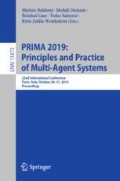Abstract
The social choice theory has focused in the past on the problem of devising methods to determine how individual preferences are transformed into collective ones. In some investigations, scholars provided methods for expressing the social choice function, that, given a set of individual preferences, computes the resulting collective choice. Other studies focused on determining under which conditions the social choice function is efficiently computable.
In this paper, we concentrate on the specific case of collective decisions, when we assume that the agents are rational: they do not express random preferences, and they do not make random choices. In this context, we define four logical problems derived and study their computational complexity: (1) Determining the rationality of a given choice, (2) Establishing a possible rational maximal subset of a given choice, (3) Computing the votes on a rational proposal, and (4) Determining a priori the winning conditions of a given rational choice.
Access this chapter
Tax calculation will be finalised at checkout
Purchases are for personal use only
Notes
- 1.
We say that a rule is applicable when all its antecedents have been proved within the current derivation step. Symmetrically, we say that a rule is discarded if at least one of its antecedents has been defeasibly refuted.
References
Andréka, H., Ryan, M., Schobbens, P.Y.: Operators and laws for combining preference relations. J. Logic Comput. 12(1), 13–53 (2002)
Antoniou, G., Billington, D., Governatori, G., Maher, M.J.: Representation results for defeasible logic. ACM Trans. Comput. Logic 2(2), 255–287 (2001)
Arrow, K.J.: A difficulty in the concept of social welfare. J. Polit. Econ. 58(4), 328–346 (1950)
Chevaleyre, Y., Endriss, U., Lang, J., Maudet, N.: A short introduction to computational social choice. In: van Leeuwen, J., Italiano, G.F., van der Hoek, W., Meinel, C., Sack, H., Plášil, F. (eds.) SOFSEM 2007. LNCS, vol. 4362, pp. 51–69. Springer, Heidelberg (2007). https://doi.org/10.1007/978-3-540-69507-3_4
Chevaleyre, Y., Endriss, U., Lang, J., Maudet, N.: Preference handling in combinatorial domains: from AI to social choice. AI Mag. 29(4), 37–46 (2008)
Conitzer, V., Sandholm, T., Lang, J.: When are elections with few candidates hard to manipulate?. J. ACM 54(3) (2007). https://doi.org/10.1145/1236457.1236461. ISSN 0004-5411
Dong, Y., Zhang, H.: Multiperson decision making with different preference representation structures: a direct consensus framework and its properties. Knowl.-Based Syst. 58, 45–57 (2014)
Endriss, U.: Judgment aggregation (2016)
Fono, L., Andjiga, N.: Fuzzy strict preference and social choice. Fuzzy Sets Syst. 155(3), 372–389 (2005)
Geist, C., Endriss, U.: Automated search for impossibility theorems in social choice theory: ranking sets of objects. J. Artif. Intell. Res. 40, 143–174 (2011)
Governatori, G., Olivieri, F., Cristani, M., Scannapieco, S.: Revision of defeasible preferences. Int. J. Approximate Reasoning 104, 205–230 (2019)
Governatori, G., Olivieri, F., Scannapieco, S., Cristani, M.: The hardness of revising defeasible preferences. In: Bikakis, A., Fodor, P., Roman, D. (eds.) RuleML 2014. LNCS, vol. 8620, pp. 168–177. Springer, Cham (2014). https://doi.org/10.1007/978-3-319-09870-8_12
Governatori, G., Olivieri, F., Scannapieco, S., Rotolo, A., Cristani, M.: The rationale behind the concept of goal. TPLP 16(3), 296–324 (2016)
Munda, G.: Social multi-criteria evaluation: methodological foundations and operational consequences. Eur. J. Oper. Res. 158(3), 662–677 (2004)
Olivieri, F., Cristani, M., Governatori, G.: Compliant business processes with exclusive choices from agent specification. In: Chen, Q., Torroni, P., Villata, S., Hsu, J., Omicini, A. (eds.) PRIMA 2015. LNCS (LNAI), vol. 9387, pp. 603–612. Springer, Cham (2015). https://doi.org/10.1007/978-3-319-25524-8_43
Pini, M., Rossi, F., Venable, K., Walsh, T.: Aggregating partially ordered preferences. J. Logic Comput. 19(3), 475–502 (2009)
Rossi, F., Venable, K., Walsh, T.: A Short Introduction to Preferences. Between Artificial Intelligence and Social Choice. Synthesis Lectures on Artificial Intelligence and Machine Learning, vol. 14, pp. 1–102. Morgan & Claypool Publishers, San Rafael (2011)
Wang, Y.M., Yang, J.B., Xu, D.L.: A preference aggregation method through the estimation of utility intervals. Comput. Oper. Res. 32(8), 2027–2049 (2005)
Zuckerman, M., Procaccia, A., Rosenschein, J.: Algorithms for the coalitional manipulation problem. Artif. Intell. 173(2), 392–412 (2009)
Author information
Authors and Affiliations
Corresponding author
Editor information
Editors and Affiliations
Rights and permissions
Copyright information
© 2019 Springer Nature Switzerland AG
About this paper
Cite this paper
Cristani, M., Olivieri, F., Governatori, G. (2019). Non-monotonic Collective Decisions. In: Baldoni, M., Dastani, M., Liao, B., Sakurai, Y., Zalila Wenkstern, R. (eds) PRIMA 2019: Principles and Practice of Multi-Agent Systems. PRIMA 2019. Lecture Notes in Computer Science(), vol 11873. Springer, Cham. https://doi.org/10.1007/978-3-030-33792-6_24
Download citation
DOI: https://doi.org/10.1007/978-3-030-33792-6_24
Published:
Publisher Name: Springer, Cham
Print ISBN: 978-3-030-33791-9
Online ISBN: 978-3-030-33792-6
eBook Packages: Computer ScienceComputer Science (R0)

